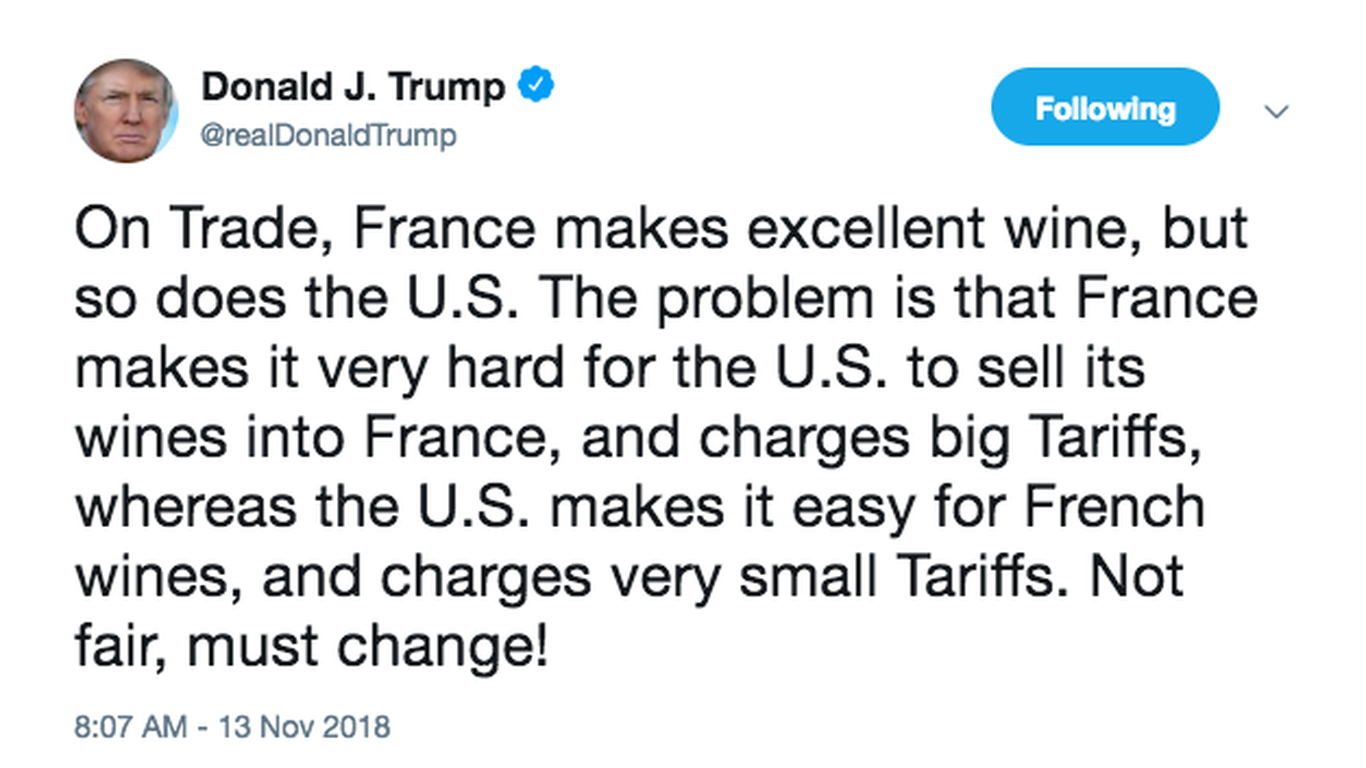Trump's EU Wine Tariff Threat: A Return To Trade Tensions?
Is history repeating itself, or are we witnessing a dangerous escalation in global trade tensions? Donald Trump's renewed threats of hefty tariffs on European wines, champagnes, and spirits cast a long shadow over international commerce, potentially triggering a full-blown trade war.
The scene, as it unfolded on Thursday, March 13, 2025, in Ville d'Avray, just outside Paris, was a stark visual representation of the brewing storm. Bottles of exquisite French wines sat on shelves in a dealer's shop, a silent testament to the potential economic upheaval. Across the Atlantic, President Trump's pronouncements echoed, promising a 200% tariff on European alcoholic beverages if the European Union followed through with its planned levies on American whiskey. This wasn't just a policy announcement; it was a shot across the bow, a calculated move that sent ripples of concern through the global economy.
The specter of a 200% tariff loomed large, a figure that could cripple the delicate balance of international trade. The implications were far-reaching, threatening to disrupt established supply chains and potentially driving up prices for consumers. As Ben Aneff, managing partner of Tribeca Wine Merchants and President of the U.S. Wine Trade Alliance, rightly pointed out, such tariffs would severely disrupt the existing structure of the industry. The potential consequences were dire, sparking concern amongst winemakers, distributors, and consumers alike.
This situation also underscores the broader geopolitical dynamics at play, where trade can be used as a political tool. The initial response from the EU and Canada to US tariffs on steel and aluminum shows how quickly these situations can escalate into a cycle of retaliatory measures.
The current trade environment can be visualized in the following format:
| Event | Description | Key Players | Potential Consequences |
|---|---|---|---|
| US Threat of Tariffs | President Trump threatened 200% tariffs on EU wine, champagne, and spirits. | Donald Trump (US President), US Administration | Higher prices for consumers, disruption of supply chains, potential trade war. |
| EU's Response | Anticipated retaliatory tariffs on US whiskey. | European Union | Further escalation of trade tensions, economic losses for both sides. |
| Retaliation | France vows to retaliate against US tariffs. | France, European Union | Further escalation of trade tensions, economic losses for both sides. |
| Industry Concerns | Wine merchants and distributors express concerns over the impact of tariffs. | Ben Aneff (Tribeca Wine Merchants, U.S. Wine Trade Alliance), U.S. Wine Industry | Disruption of wine trade, economic hardship for businesses, job losses. |
The historical context of these actions is critical to understanding the situation. During his first term, Trump had already targeted Spanish olives, German wine, and Irish whiskeys, thus souring trade ties. Now, this cycle of punitive measures threatened to spiral out of control, leading to wider economic repercussions.
The echoes of past conflicts were hard to ignore. The threatened tariffs on European wines, champagne, and spirits were reminiscent of Trump's first term, when he threatened 100% tariffs on French wine and cheese over its plan to tax American tech companies. This pattern of using trade as a weapon, a tool to exert pressure and achieve political goals, had become a defining feature of his approach to international relations.
The impact of these potential tariffs is not just about the price of a bottle of wine; it's about the stability of global supply chains. For businesses that rely on smooth cross-border transactions, such disruptions can be devastating. Ms. Taylor, who imports 2 million bottles a year, knows this firsthand. She weathered the 25% tariff Trump put on certain EU bottles during his first term by expanding her distribution in Europe. The 200% tariff, however, is a completely different scale of challenge.
Furthermore, it's important to note that the impact of these tariffs is not just isolated to the producers of wine. The U.S. winemakers, as well as winemakers around the globe, are likely to be affected by this measure. The distributors who run global supply chains are also wary of the potential trade conflict.
Trump's rhetoric has been consistent. He accused the EU of being one of the most hostile and abusive taxing and tariffing authorities in the world. The president has a clear objective: to protect the interests of American businesses and workers. The EU, however, feels that this approach undermines the established framework of global trade, and in doing so, threatens the overall health of the world economy.
In response to the president's actions, the European Union has made it clear that they will respond in kind to any tariffs imposed by the U.S. French Foreign Trade Minister Laurent, stated that the country would retaliate against any tariffs imposed. The EU has previously been quick to respond to Trump's trade policies. This includes swift action against tariffs on steel and aluminum.
The question that remains is how this will play out in the coming weeks and months. Will cooler heads prevail, or will the threat of tariffs become a reality? The answer may well depend on the willingness of both sides to find common ground and avoid a destructive trade war.
One of the key considerations is the impact that such policies will have on American consumers. Tariffs on wine and alcohol will increase the price of these products, reducing purchasing power and limiting consumer choice. This is something that has been emphasized by figures like Ben Aneff, who has made it clear that the trade tariffs would have a negative effect on the industry.
The situation remains fluid, with both sides seemingly dug in. While the threat of a 200% tariff is a drastic measure, it is not yet in effect. It's crucial for all involved to weigh the potential economic and political consequences of their decisions. The world is watching.

Trump threatens retaliatory 200 tariff on European wine after EU

U.S. and Europe Struggle to Put Trump Era Tariffs Behind Them WSJ

Trump threatens France on wine tariffs